2021–22
Preparing Stanford students for lives of active citizenship
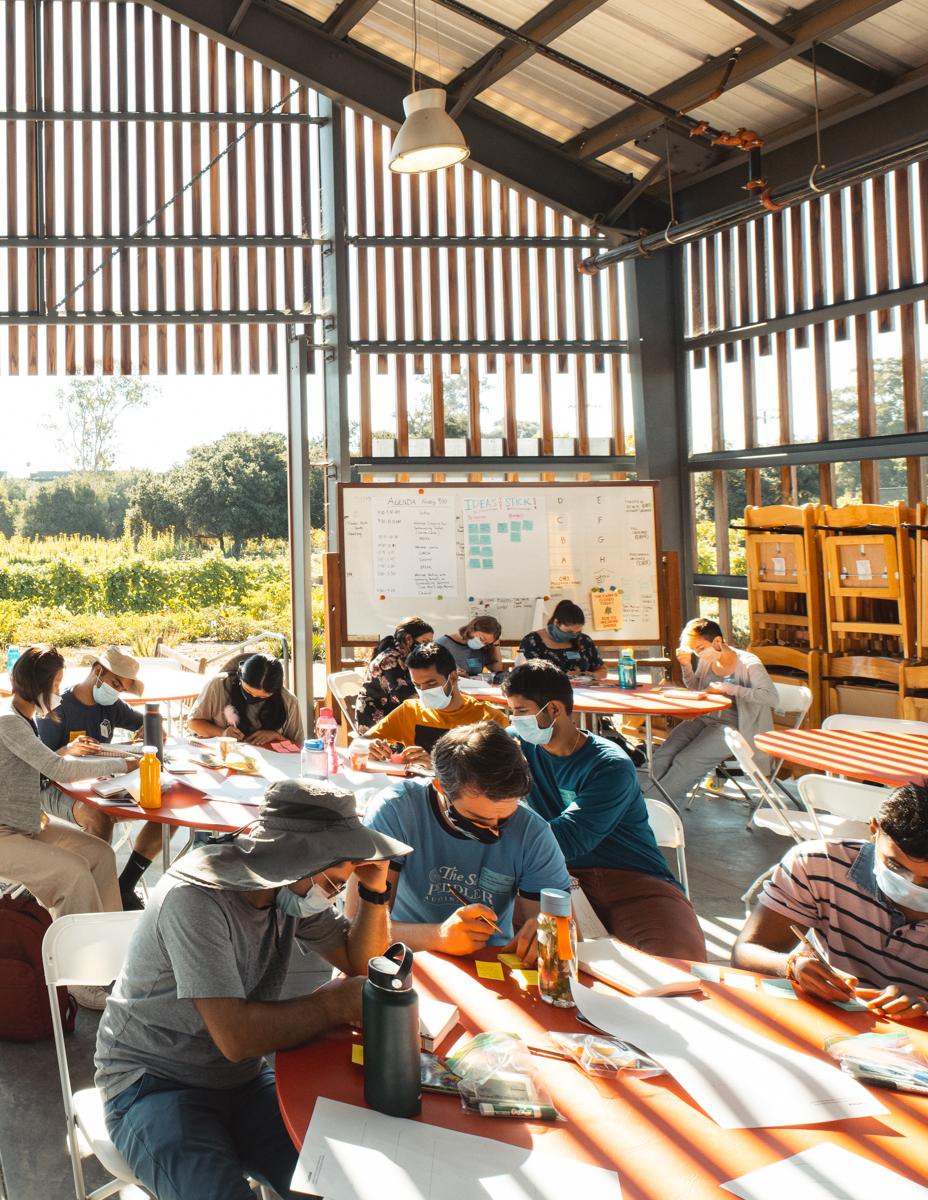
•
•
•
Cardinal Quarter
Cardinal Courses
Cardinal Commitment
Cardinal Careers Cardinal Service
Cardinal Service—a campus-wide
Cardinal Service harnesses the strengths of diverse centers, programs, and courses to:
• prepare students to be citizens and leaders,
• accelerate solutions to humanity’s greatest challenges, and
• support our diverse community.
Thank you for supporting this effort to grow Stanford’s legacy of service.
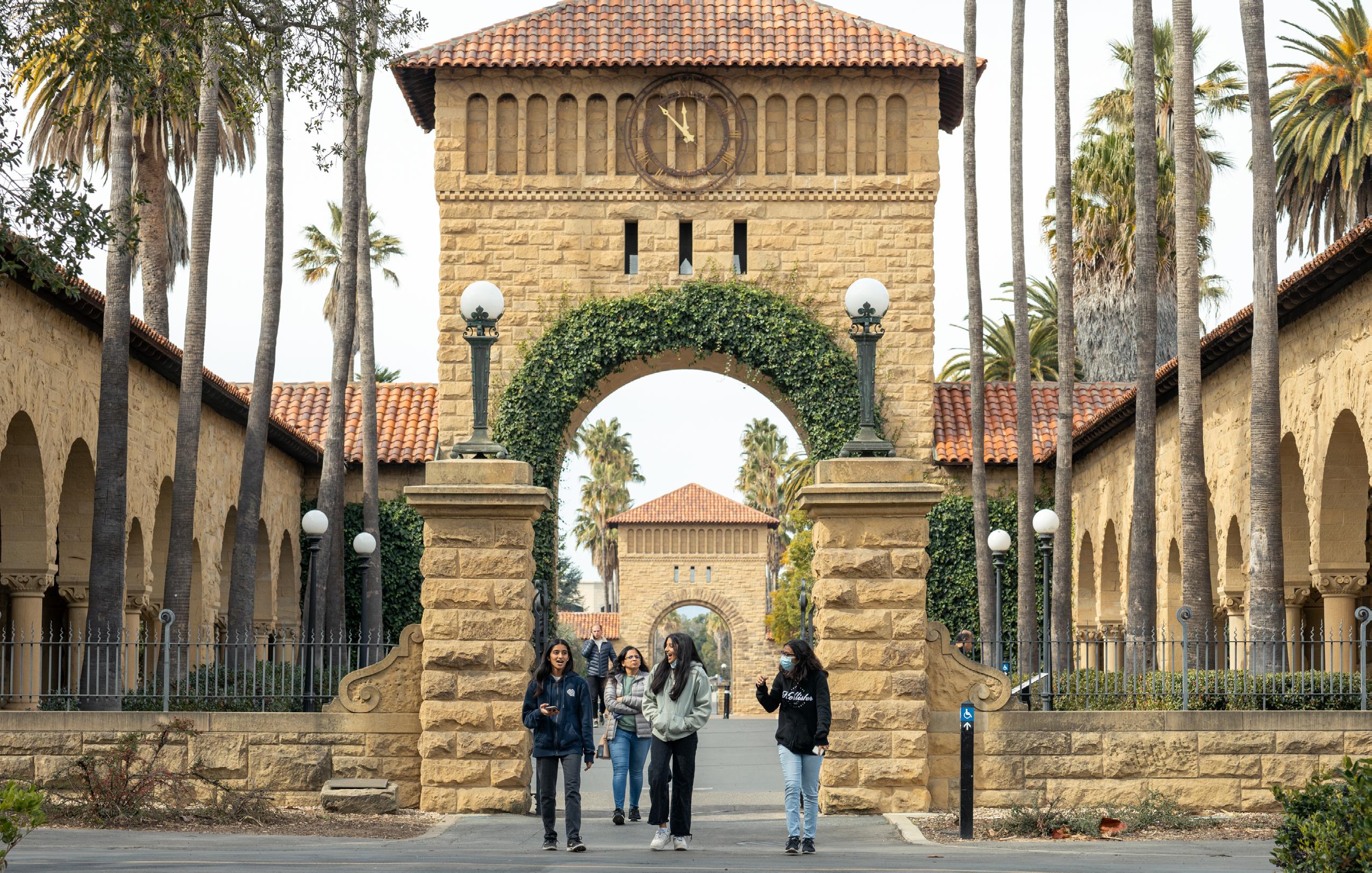
cardinalservice.stanford.edu
collaboration to introduce students to public service and civic engagement—is helping Stanford University to fulfill its vision and founding purpose of promoting the welfare of people everywhere.
CARDINAL QUARTER
Study away: a test run for the real world Stanford in Government supports students working in policy Partnerships for Climate Justice in the Bay Area
CARDINAL COMMITMENT
Service as part of the first-year experience
Issue Area Coordinators program expands Student organizations return to in-person service
Alternative Spring Break Students for a Sustainable Stanford Stanford in Government
Future Advancers of Science and Technology
CARDINAL COURSES
Integrating academic and experiential learning Service in academic milestones
Making art more accessible
Interdisciplinary collaboration for community health
Environmental justice
New course on Deliberative Democracy
CARDINAL CAREERS
Springboards to public service careers
Truman Scholars
Cardinal Careers fellowships
Other Cardinal Careers Fellows
NEW DIRECTIONS
Pipelines to public interest technology careers
New Stanford traditions celebrating service and civic engagement
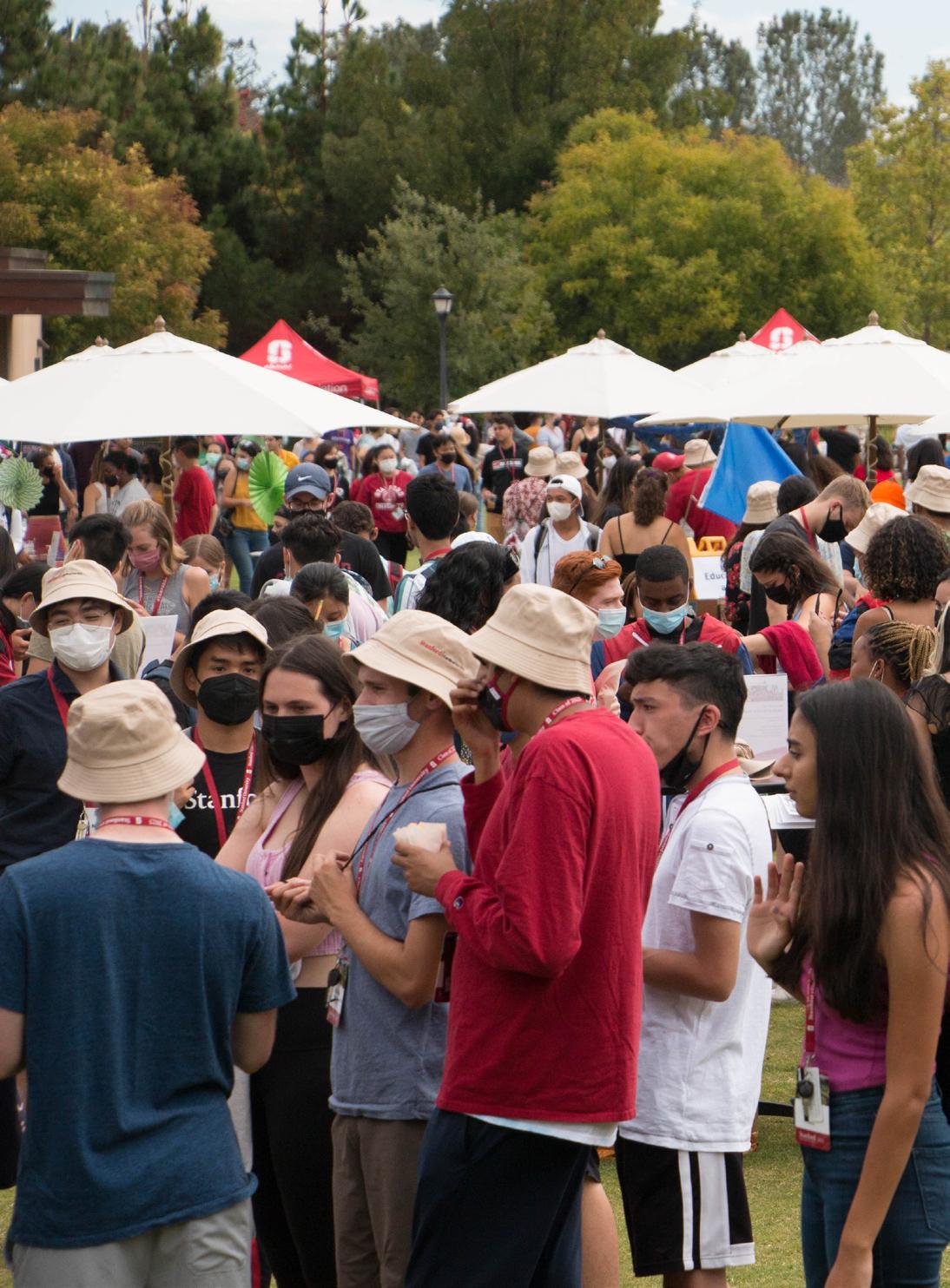
Supporting graduate students to tackle today’s issues
Accelerating evidence-based solutions
Advancing climate solutions
Strengthening community partnerships
Students engaged in an activity at the O’Donohue Family Stanford Educational Farm
In spring, the Stanford Faculty Senate voted to make the Cardinal Service transcript notation a permanent feature on students’ academic records so that students can have their service commitments reflected as integral to their Stanford education. Students are eligible to apply for the notation if they complete key transformative programs: a Cardinal Quarter internship or fellowship, or 12+ units of Cardinal Courses.
In addition, the Faculty Senate approved eligibility through Cardinal Commitment if students complete the Public Service Leadership Program by:
• sustaining a service commitment for at least three quarters;
• completing two related courses and the gateway course, Ethics and Leadership in Public Service; and • engaging regularly with an advisor and a peer cohort.
Contents • Cardinal Quarter • Cardinal Commitment • Cardinal Courses • Cardinal Careers • New Directions 3
Contents
Cardinal Service Fair, fall 2021
Front cover
Cardinal Service Notation made permanent and expanded to include Commitment
Read more
. 4 4 5 5 6 6 7 7 7 7 7 7 8 8 8 9 9 9 9 10 10 11 11 11 12 12 12 12 13 13 13
in Stanford Report
Cardinal Quarter
Through Cardinal Quarter, students engage in full-time, summer or quarter-long service fellowships and internships. They build knowledge, skills, and networks while making meaningful contributions to communities locally, nationally, and across the globe.
Thirty campus partners awarded a total of 445 Cardinal Quarter opportunities to undergraduates this year. This is up from 319 last year—a rebound in numbers after COVID restrictions, and a reflection of robust outreach efforts that included engaging six peer advisors and hosting two virtual Cardinal Quarter opportunity fairs.
The majority of Cardinal Quarter fellowships were domestic due to international travel restrictions, and most students served in person or in hybrid arrangements.

To see where students served this summer, visit the Cardinal Quarter map and choose Fellowship Period Summer 2022.
Study
away: a test run for the real world
Students can pursue a Cardinal Quarter through one of Stanford’s off-campus experiences run by the Bing Overseas Study Program. These programs offer students the chance to live, study, and work in a new city, and give them a taste of what life might be like post-college.
A QUARTER IN THE BIG APPLE
Through Stanford in New York, students spend an academic quarter taking classes and experiencing NYC culture while working full time. To qualify for the Cardinal Quarter program, students work at a government agency or nonprofit organization.
In the spring of 2022, Tanner Christensen, ’24, interned at the New York City Commission on Human Rights in the Law Enforcement Bureau. Tanner’s job involved processing housing and employment discrimination cases, “working to help New Yorkers fight for justice and ensure that they are not being discriminated against.”
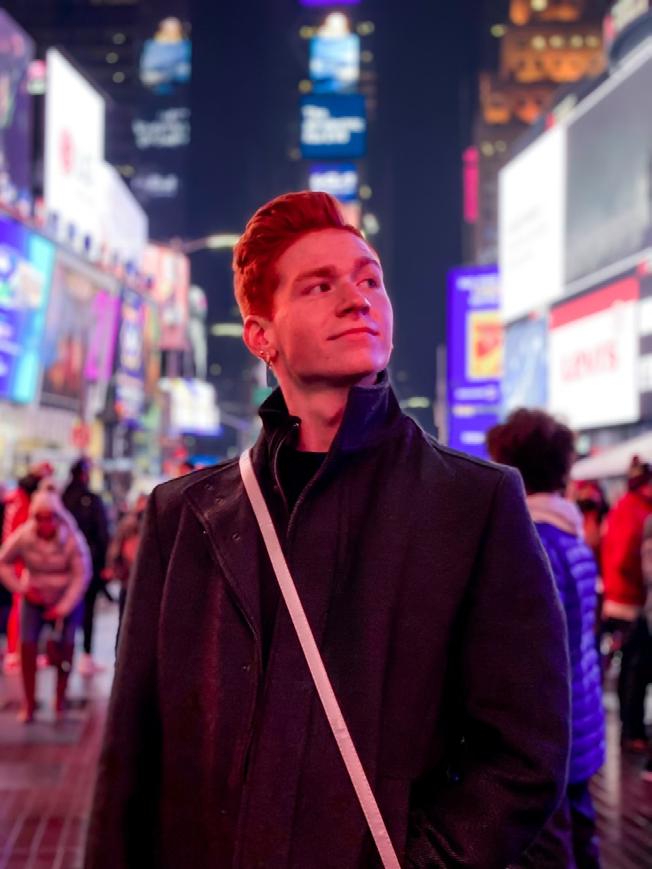
cardinalservice.stanford.edu
Stanford in Government supports students working in policy
This past summer, 12 students were supported through Stanford in Government (SIG) stipends to work in unpaid policy internships. SIG stipends are part of the Cardinal Quarter program.
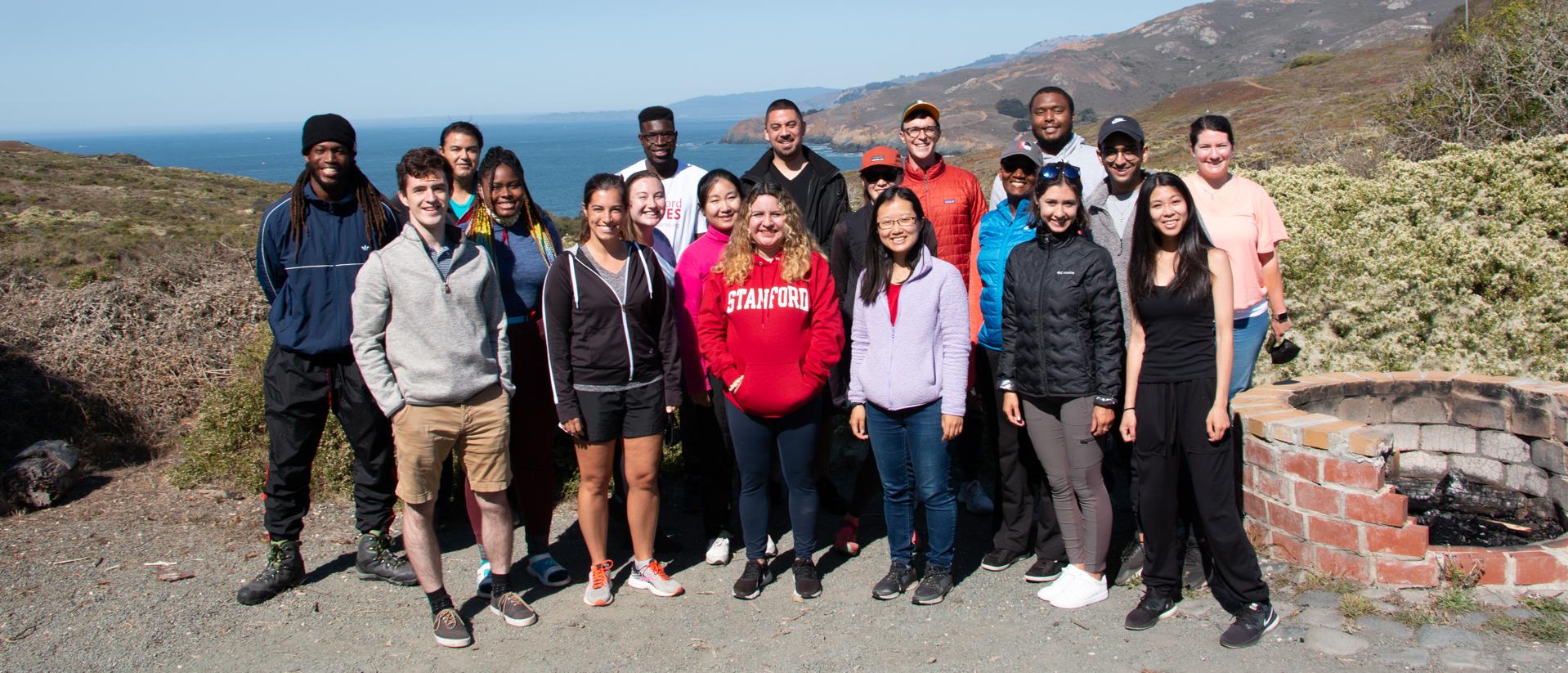
“Most of my life, I wanted to become a doctor to serve the Vietnamese community and work to fight the medical mistrust that occurs in immigrant communities due to the lack of culturally competent care. However, local governments have much potential to support the work of frontline healthcare workers and ensure access to healthcare. I plan to not only work in the clinic but remain involved in the policy space to ensure that medical professionals who work in the field are informing the policy decisions that elected officials make.”
Zachary Nguyen, ’24, returned home to Texas to work in the office of Harris County Judge Lina Hidalgo.
Partnerships for Climate Justice in the Bay Area
Partnerships for Climate Justice in the Bay Area (PCJ in the Bay) is an initiative of the Haas Center that supports partnerships between Stanford students, faculty, and staff and Bay Area community leaders to help build equitable climate change solutions. The program funds a cohort of graduate and undergraduate students, advised by Haas Center staff, in Cardinal Quarter summer internships.
“This fellowship gave me the opportunity to experiment on what I wanted to do with my career and allowed me to see a nonprofit through the lens of somebody running and managing it. One of the biggest lessons I learned from this fellowship is that the impact of a team is not always proportional to the number of members they have. The impact Thrive has had on the County of San Mateo is incredible and I am glad to be a part of what they do.”
Vel Senthil, ’25, worked with Thrive Alliance, an environmental justice organization that operates predominantly in San Mateo County.
“I worked with OneShoreline to identify potential pilot communities for launching a community insurance scheme. After analyzing FEMA’s National Flood Insurance Program policy data combined with the U.S. Census, we identified several vulnerable communities where the cost burden of flood insurance is high relative to the county average. Based on this research, we will be engaging local city staff and finance experts to structure a community insurance scheme. This was an invaluable opportunity for me to contribute to local impact and public service in parallel with my PhD research.”
June Choi, a second-year PhD student in earth system science, worked at OneShoreline, an independent government agency of San Mateo County that focuses on improving resilience to sea level rise and flooding.
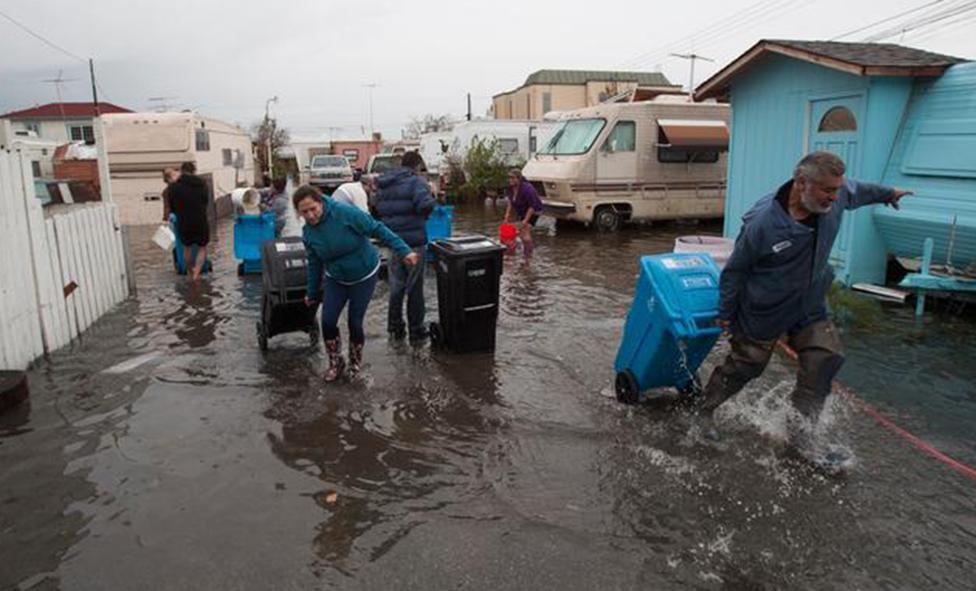
Contents • Cardinal Quarter • Cardinal Commitment • Cardinal Courses • Cardinal Careers • New Directions 5
The Graduate Public Service Fellows cohort
Photo credit: OneShoreline.org
The Civic Engagement IAC worked on events, partnerships, and outreach for Stanford’s first-ever Democracy Day, a day without classes designed to promote democratic participation, civic engagement, and community building.
Through Cardinal Commitment, students commit to three quarters or more of service to an organization, community, or issue. The program offers advising, funding, connections, training, and opportunities to reflect on their service goals.
Service as part of the first-year experience
A cohort-based service-learning experience can help incoming first-year students develop friendships and deepen learning, while introducing them to the area’s social and environmental challenges and opportunities.
A new public service pre-orientation program gave 30 firstyear students the chance to get to know one another, find out about Cardinal Service, and learn about Stanford’s neighboring communities. In this inaugural year, the program was called the Cardinal Service Pre-Orientation Experience; going forward, it will be called Ignite.
Students visited three local nonprofits: the Palo Alto Art Center, The Big Wave project for adults with special needs, and Community Legal Services in East Palo Alto. The visits were designed to help students reflect on public service, community partners, and issues they might be interested in pursuing.
“The Cardinal Service Pre-Orientation Experience was the perfect balance between helping frosh feel welcome and connected to Stanford and a little crash course in public service.”

Allan Lopez, 2021 student program leader
The Cardinal Service Fair during New Student Orientation welcomed nearly 1,400 first- and second-year students, on campus for the first time, connecting them with hundreds of service opportunities and representatives from more than 70 student-led organizations.
The Service Liaison program, a leadership development and outreach program for first- and second-year Stanford undergraduates, recruited more than 60 students from every first-year dorm on campus. Service Liaisons meet weekly to learn about and promote service opportunities to their fellow residents, as well as strengthen their leadership skills.
cardinalservice.stanford.edu
Cardinal Commitment
Issue Area Coordinators program expands
The Issue Area Coordinators (IAC) program doubled participants since last year’s pilot from three to six, covering Affordability, Civic Engagement, Education, Environment, Health, and Public Interest Technology. In addition to coordinating events and partnerships among campus and community groups in their issue areas, the cohort participated in weekly training in collective leadership and biweekly meetings with staff advisors.
Student organizations return to in-person service

Cardinal Commitment supports almost 150 student organizations engaged in a variety of public service activities—from Greek organizations and elected class representatives, to public policy groups and arts organizations that serve home-bound seniors. The 2020-21 academic year was difficult for student organizations as COVID-19 constraints forced them into a virtual service model; this year saw the gradual return to in-person public service work.
Alternative Spring Break
Alternative Spring Break trips were closer to campus this year, but reflected a variety of student interests: “Pilipinx Issues,” “Soul of the City,” and “Asian American Issues” in the Bay Area, as well as “Just Corn and Cows? The Rural Divide” in California’s Central Valley.
“It was great to get back out in the community,” said Lorenzo Del Rosario, ’24, this year’s student program director and a trip leader with Pilipinx Issues. “Connecting with people and learning about their challenges and how we can all play a role in addressing them is key to the health of any community. And it was great to hang out with other students away from campus.”
Students for a Sustainable Stanford (SSS)

SSS connects environmentally minded students to advocacy and direct service projects on and around campus. Its airport shuttle program, now in its third year, transported almost 500 Stanford students to Bay Area airports for the academic year breaks. Not only did students get $5 rides to the airport, but SSS estimates that CO2 emissions were reduced by about 2.5 tons by these students not using cars to travel.
Stanford in Government (SIG)
With a focus on careers in government, SIG organized panels for current students to learn from alumni about their public service career trajectories. They also partnered with Cardinal Careers on a class, Public Service and Social Impact: Pathways to Purposeful Careers. Designed to help Stanford students learn about the diverse ways they can create impact in the world upon graduation, the course featured speakers including Condoleezza Rice (Hoover Institution), Adam Fong (Hewlett Foundation), and Amanda Renteria (Code for America).
Future Advancers of Science and Technology (FAST)
FAST is a graduate student organization that works with high school students on STEM research and development projects. Between September and April, high school students work on projects with their FAST mentors, and in spring, present their work at local and state science fairs, as well as an annual symposium on campus.
“I got to be a part of such a welcoming community, met so many wonderful people and friends, and got to learn about science and even myself along the process,” said Nha Quyen N., a high school participant. “I’ll be majoring in chemistry at SJSU so I’ll definitely use my experience at FAST to help me during my college journey.”
Contents • Cardinal Quarter • Cardinal Commitment • Cardinal Courses • Cardinal Careers • New Directions 7
Program manager Kristy Lobo (center) with Issue Area Coordinators, left to right: Megha Parwani (Civic Engagement), Francesca Kim (Health), Olivia Kline (Environmental Sustainability), Liz Aguilar (Education)
Students participate in a workshop organized by the Issue Area Coordinator for Health
Cardinal Courses
Community-engaged learning has become a cornerstone of Stanford’s core curriculum, from first-year requirements through senior-year capstone projects that reflect the culmination of students’ academic learning.
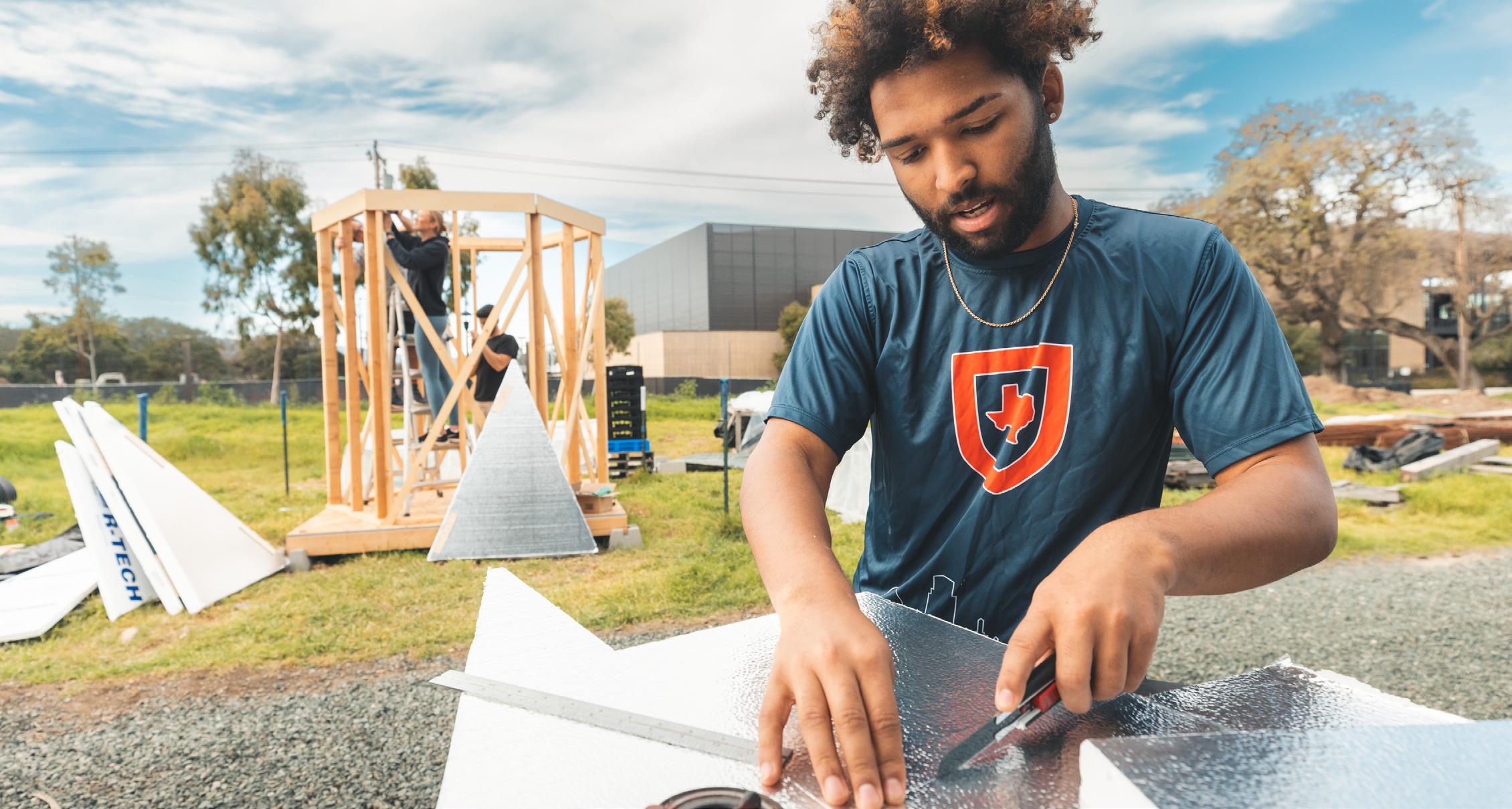
This year, Stanford instructors across 57 academic departments and programs offered 187 Cardinal Courses, involving 2,051 unique students. Of 830 students who completed a course survey, 89 percent agreed that the community-engaged component deepened their understanding of the course material.
A new Cardinal Courses Dashboard, displaying engagement with community partners in the region by thematic area, is designed to promote greater coordination and collaboration to address community needs while enhancing student learning.
Integrating academic and experiential learning
In order to integrate service into the new first-year COLLEGE course requirement, Citizenship in the 21st Century, the Haas Center contributed a module on “public service and citizenship” with an optional final assignment for students to develop a Cardinal Quarter proposal that would put their civic commitments into action. Nine students submitted proposals and four were awarded inaugural fellowships in the summer on topics ranging from increasing Black and Latinx home ownership in Houston to reducing the education gap in rural Mississippi. Students and faculty reported that this option allowed them to apply classroom discussions on the rights and responsibilities of citizenship to the real challenges facing their own communities.
Service in academic milestones
Students enroll in Cardinal Courses as they engage more deeply in academic fields across disciplines. For example, students are required to complete 12 units of Cardinal Courses in the new environmental justice minor.
In addition, with capstones now a requirement in all majors, we continue to expand our support for community-engaged capstones—known as Cardinal Capstones—in which students work with a community partner to apply academic knowledge to address community needs. As an example, 46 students in Mechanical Engineering Design: Integrating Context with Engineering designed modular housing for refugees as part of their capstone projects.
cardinalservice.stanford.edu
Students working on their capstone project for ME170: Mechanical Engineering Design – Integrating Context with Engineering
Making art more accessible
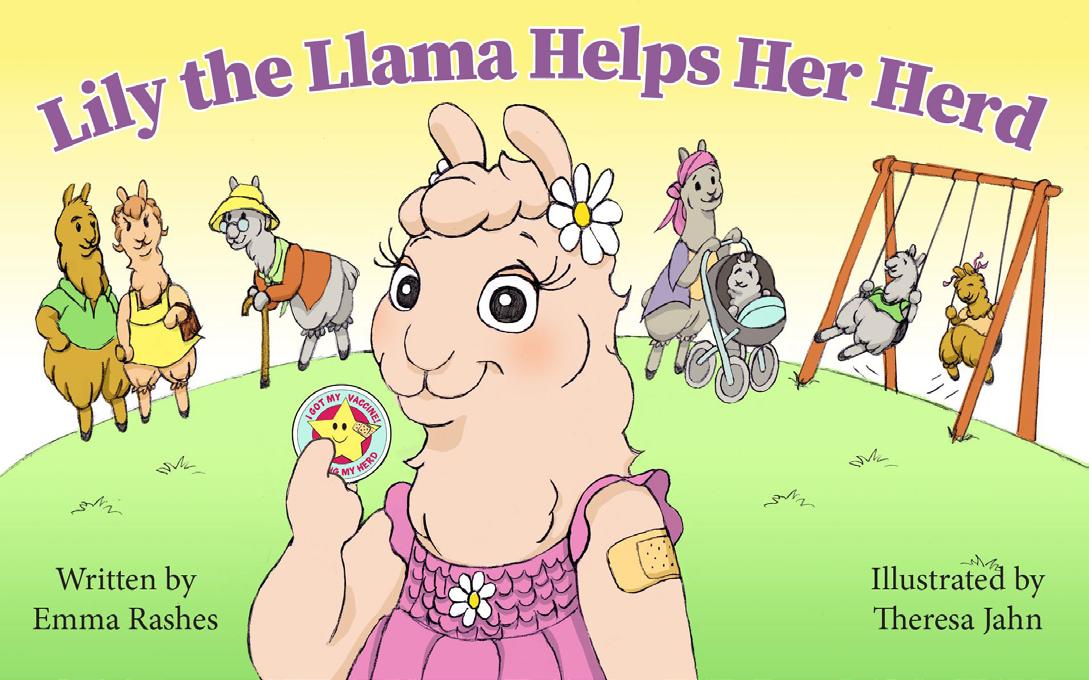
Students in two Cardinal Courses—one at the Stanford Graduate School of Education (GSE) and another in the School of Engineering— worked with the on-campus Cantor Arts Center staff and members of a grassroots Bay Area group to conceptualize ways to make the museum more accessible for vision-impaired visitors. They met with members of the Blind Posse, a Bay Area group focused on improving access to art for residents who are blind or have low vision, to generate and, when possible, prototype ideas that ranged from a small-scale, 3-D sculpture of Rodin’s The Thinker that visitors can touch, to audio narration about the art, to a video about the obstacles a graduate student on the team who is blind encountered during her visit. Cantor Art Center staff now have numerous ideas to pursue in enriching the museum experience for all visitors.
Read more from the GSE
Environmental justice
In the Stanford Report article, “Equity seed grant bolsters environmental justice efforts,” three Cardinal Courses were featured for their efforts and achievement in environmental justice. They were supported by seed grants from the Sustainability Initiative and received Cardinal Course grants.
• Introduction to Environmental Justice: Race, Class, Gender and Place
• Land Justice: Unearthing Histories & Seeding Liberation
• Shades of Green: Exploring and Expanding Environmental Justice in Practice
Interdisciplinary collaboration for community health
Since April 2020, a Cardinal Course through the School of Medicine, PEDS 220: COVID-19 Elective, has addressed emergent health needs related to the coronavirus pandemic by integrating medical learning with community-based work. The course is designed for graduate and undergraduate students in medical and non-medical fields, as well as practicing physicians. Students partner with community organizations to identify community needs and propose projects to address them. The course includes a weekly session on best practices for community-engaged work. An article on the making of the course was published in the Journal of Medical Education and Curricular Development and includes a case study of a project to create a children’s book to teach about herd immunity and vaccines.
New course on Deliberative Democracy
A new course, COMM 11SC: Deliberative Democracy in Theory and Practice: Deliberating the Issues that Divide Us and Beyond, introduces students to Deliberative Polling, where participants are provided with balanced information about issues, discuss them with one another. They are polled before and after their deliberation, to determine whether the process has influenced their positions. Students in the course have the opportunity to prepare materials for a crossinstitutional Deliberative Polling experiment.
Other new Cardinal Courses cover a broad range of topics including economics, the environment, local government, and community organizing.
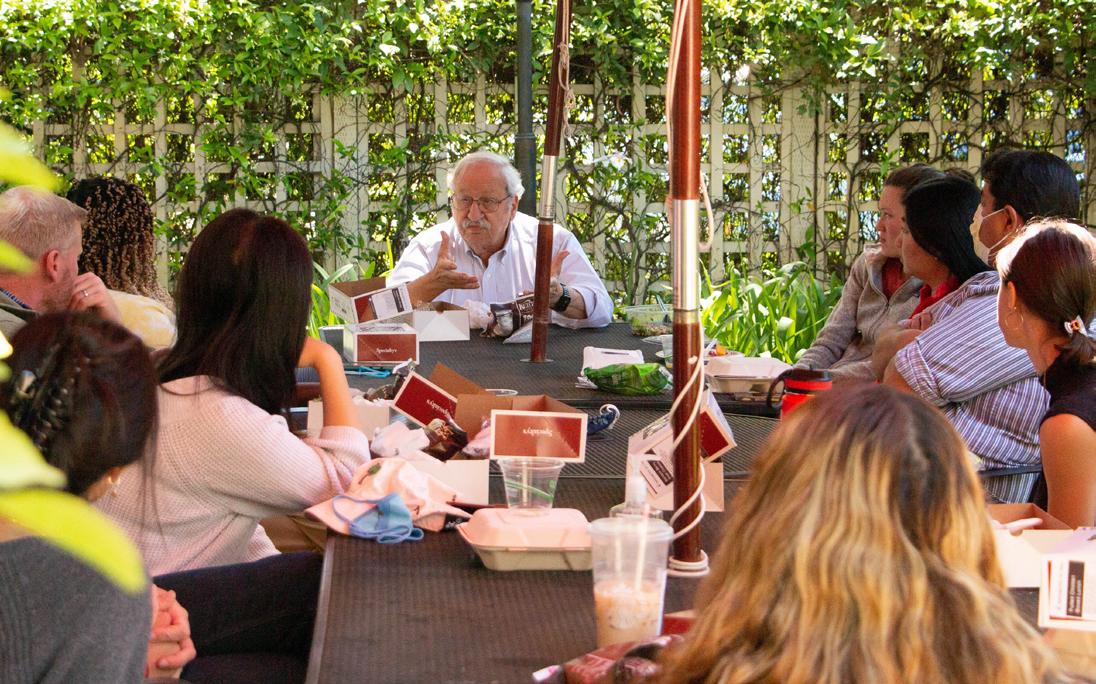
Contents • Cardinal Quarter • Cardinal Commitment • Cardinal Courses • Cardinal Careers • New Directions 9
Public Service Narrative workshop with Marshall Ganz
Cardinal Careers
Through Cardinal Careers, students have access to recruiting and networking events, internship and career opportunities, and tailored coaching and advising to help them find jobs in public service.
This year, 100 students enrolled in Public Service and Social Impact: Pathways to Purposeful Careers, a course to help students learn about the diverse ways they can create impact upon graduation, which was offered for credit through six academic departments. The Cardinal Careers team co-taught an accompanying public service careers exploration and preparation seminar.
Springboards to public service careers
Cardinal Careers offers in-person support for seniors and new graduates at a key moment in their career trajectory. The Public Service Careers Network launched this year offers seniors advising, mentorship, job search skills workshops, and a strong community of peers to help them navigate their public service job search. Stanford Alumni in Public Service supported the Network by recruiting alumni to participate as mentors for students considering careers in specific public service fields.
The Public Service Job Search Support Guarantee backed by the Haas Center and Stanford Career Education provides graduating students with the reassurance that they will continue to receive career advising, coaching, and access to Stanford career resources until they are offered a job.
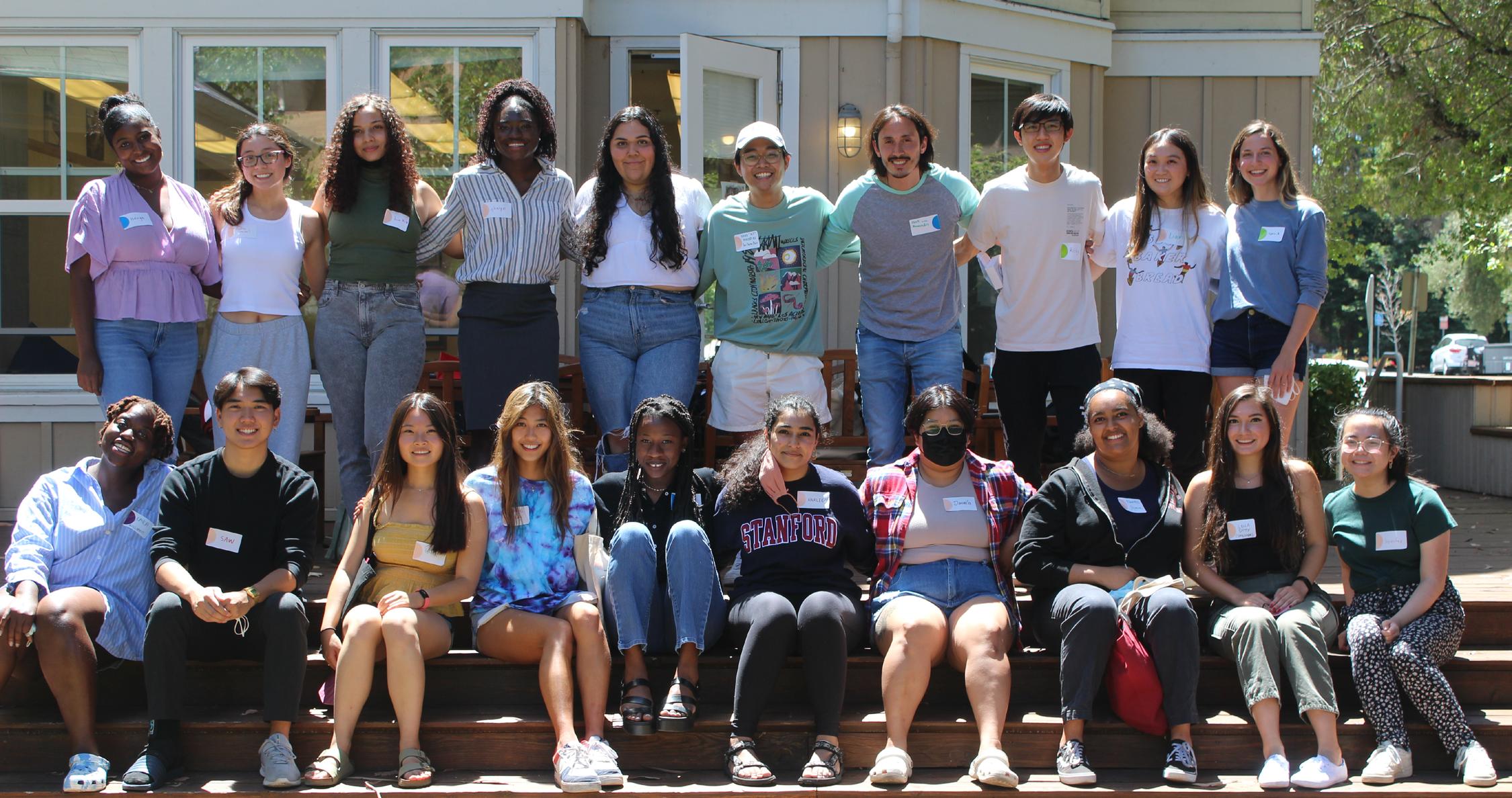
The Public Service Careers Community of Practice includes 45 staff members representing 33 departments and centers on campus that support students considering public service careers. The group meets quarterly. This year, the Careers team partnered with the Ford Dorsey Master’s in International Policy program at the Freeman Spogli
Institute to host an info session for graduate and undergraduate students interested in the National Counterterrorism Center and other intelligence community agencies.
In fall and spring, Stanford Career Education and the Haas Center hosted events to connect students with a wide variety of public service employers. Stanford’s Fall Virtual Career Fair featured 55 public service and social impact employers, and the Social Impact Virtual Career Fair in April featured 52 organizations and was attended by more than 150 students.
One focus of Cardinal Careers efforts is making the daunting process of getting hired for PIT government roles more accessible for students. The Cardinal Careers team hosted alumni Sarah Goodman, ’20, and Paco Torres, ’07, JD ’11, to introduce students to the Capital Fellows Programs, nationally recognized one-year policy fellowships in various branches of California state government. California’s economy is the largest in the United States and the fifth largest in the world, making roles in California government unique in their scope and influence.
cardinalservice.stanford.edu
Left to right from top: Lina Abu Taweeleh, Grace Achepohl, Julian Aguilar, Hamzeh Daoud, Minha Khan, Sarah Kratzer, Les Levy, Michelle Ly, Marisa Mission, Tricia Monte, Avery Muniz, Jessica Reynoso, Erik Ruiz, Faatimah Solomon, Alexa Thomson, Angeline Truong, Sarah Verschoor, and Annie Zheng.
Truman Scholars
The Cardinal Careers team facilitates the Stanford nomination process and supports applicants for the prestigious Truman Scholarship. Stanford had five finalists selected from 705 candidates nominated nationally, and was one of six institutions that had two scholars selected. Juniors Avi Gupta and Liana Keesing, both of whom are dedicated to bringing their technology skills to improve public policy, were selected as 2022 Truman Scholars. Gupta is chief of staff for the PIT Lab at Stanford and a founding member of LifeMech, an organization that designed open-source, FDA-approved ventilators at the beginning of the COVID pandemic. Keesing has always been interested in using technology to strengthen democracy. She co-directed StanfordVotes and co-founded a startup, Offset AI, to support agriculture. Gupta and Keesing will each receive a $30,000 scholarship for graduate school in preparation for careers in public service.
In addition, they join the Truman Scholars network, which includes U.S. Supreme Court Associate Justice Neil Gorsuch, former White House Domestic Policy Advisor Susan Rice, former Arizona Governor and Secretary of Homeland Security Janet Napolitano, and Fair Fight founder Stacey Abrams. Read more in Stanford Report
Cardinal Careers fellowships
Twenty-seven Stanford students have undertaken career-launching post-graduation fellowships this year. Fellowships offer hands-on experience with leading public service organizations in the Bay Area and nationwide, as well as access to a network of current and former Fellows.
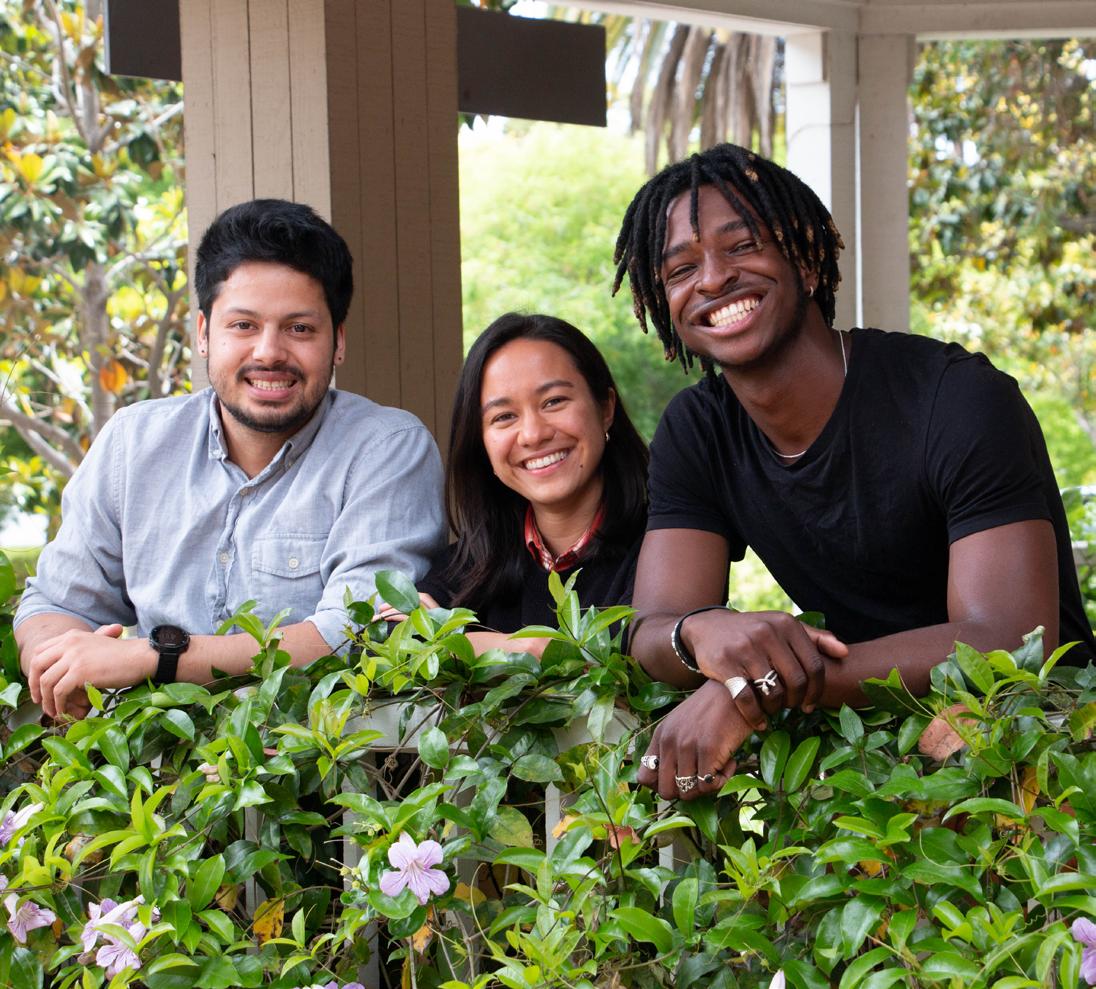
Fellows are matched with mentors who are senior leaders in the field to help them make the most of the fellowship experience and navigate professionally. While Fellows’ pathways vary—from philanthropy to direct service, research, or advocacy—their projects typically offer a level of access and responsibility typically reserved for people much further along in their careers.
Community Impact Fellowships
The Community Impact Fellowship program continues to expand efforts to connect graduating students with first jobs in service, with 17 graduating seniors and coterms pursuing year-long fellowships with 10 placement partners. In comparison, eight fellows served with three placement partners in 2013-14. This year, the Community Impact Fellowship program piloted a new mentorship program which included nine alumni mentors, offering additional support for Fellows in their first year. Fellows also had the opportunity to participate in a pilot program to receive support finding affordable housing in the Bay Area in an attempt to make the Community Impact Fellowship more accessible to first-generation and low-income students. Fellows could engage with housing specialists with expertise finding housing in San Mateo and Santa Clara counties where the majority of fellowships are located.
Other Cardinal Careers Fellows
JOHN GARDNER PUBLIC SERVICE
FELLOWSHIP
• Nik Marda, ’21; White House Office of Science & Technology Policy; Washington, D.C.
• Jackie O’Neil, ’21; NAACP Legal Defense & Educational FundThurgood Marshall Institute; Washington, D.C.
• Chloe Stoddard, ’21; NYC Commission on Human Rights; New York City, NY
TOM FORD FELLOWSHIP IN PHILANTHROPY
• César Arévalo, ’20, MS ’21; The MacArthur Foundation; Chicago, IL
• Jasmin Dalsgaard, ’21; Draper Richards Kaplan Foundation; Menlo Park, CA
• John Okhiulu, ’21; The Decolonizing Wealth Project/Liberated Capital; Remote; Oakland, CA
SCHNEIDER FELLOWS AT THE NATURAL RESOURCES DEFENSE COUNCIL
• Jordan Brinn, ’20, MS ’21; Eastern Sustainable Energy and Climate Fellow; New York, NY
• Jacqueline Ennis, ’20, MS ’21; Federal Climate and Clean Energy Policy Analysis Fellow; Washington, D.C.
• Valeria Rincon, ’21, MS ’21; Midwest Sustainable Energy and Climate Fellow; Chicago, IL
• Kiki Velez, ’21; Western Sustainable Energy and Climate Fellow; San Francisco, CA
Contents • Cardinal Quarter • Cardinal Commitment • Cardinal Courses • Cardinal Careers • New Directions 11
Tom Ford Fellows, left to right: César Arévalo, Jasmin Dalsgaard, and John Okhiulu
New Directions
Pipelines to public interest technology careers
Cardinal Service programs offer students paths to public interest technology (PIT) careers through courses, fellowships, support for students’ service commitments, and career guidance—this year with a focus on identifying PIT roles in the private sector. Students had access to over 30 PIT fellowships through Cardinal Quarter, as well as Cardinal Courses such as Bridging Policy and Tech Through Design
The PIT initiative co-hosted two virtual, national PIT career fairs with New York University, Pepperdine’s School of Public Policy, and University of Washington’s Information School, serving hundreds of interested students. To prepare students for ethical considerations when working in PIT, the initiative hosted two PIT ethics workshops during spring quarter in partnership with the Center for Ethics in Society.
engagement and democracy-building efforts at Stanford and includes articles on a deliberative polling practicum; global citizenship in COLLEGE, the new first-year curriculum; and Democracy Day. In addition, several institutions have reached out to Stanford for assistance in replicating the Election Day holiday model, and Stanford’s efforts are featured in the paper, “Building Democratic Campuses: Assessing Innovations in Democratic Practice in Higher Education” from Johns Hopkins University.
Honoring alumni in service across sectors
As Stanford prepares graduates to be engaged global citizens and leaders, the new President’s Award for the Advancement of the Common Good celebrates alumni making a difference through their dedication to public service. This year’s inaugural recipients are Jimmy Chen, ’10, founder and CEO of Propel, an anti-poverty software company; and Camara Phyllis Jones, MD ’81, a physician and epidemiologist whose research and advocacy have changed the national conversation on racism and health.
In addition, the Stanford Alumni in Public Service group established this year brings together alumni advancing change across sectors.
Supporting
graduate students
to tackle today’s issues
Stanford programs are equipping graduate students to pursue collaborative research to accelerate solutions to societal problems.
The Research as Praxis workshop series, now in its second year, helped graduate students learn about and develop skills in community-based scholarship. Speakers included academics, leaders, and practitioners across disciplinary fields.
RAISE Doctoral Fellowship
New Stanford traditions celebrating service and civic engagement
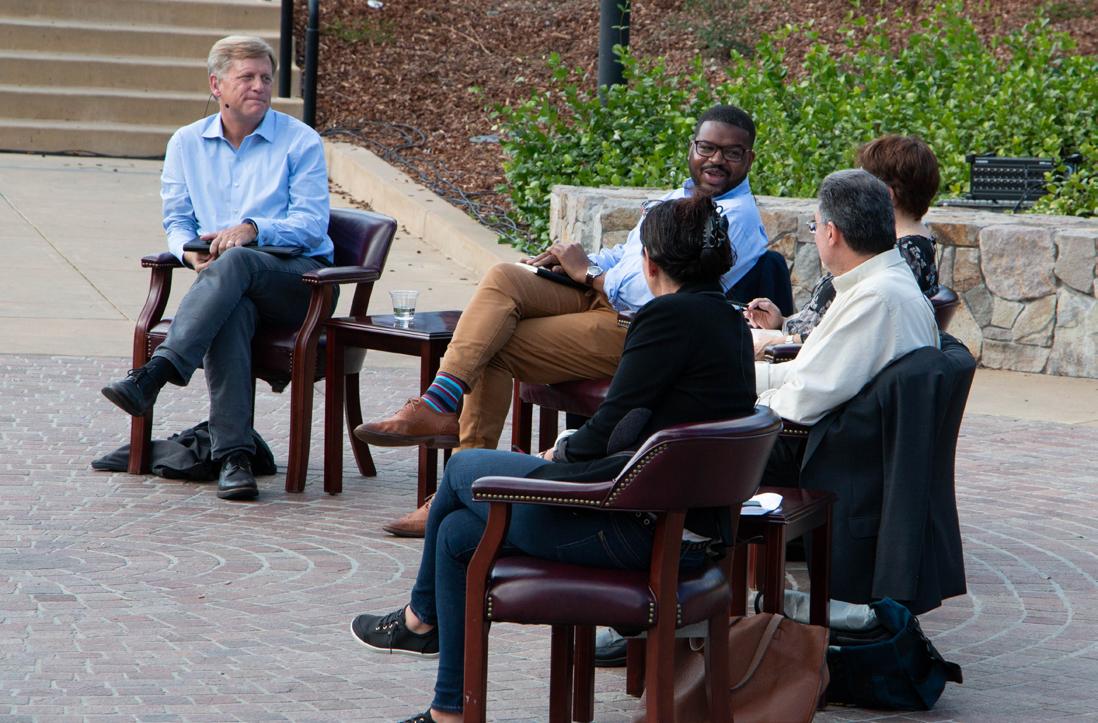
Stanford has established itself as a leader in higher education for fostering civic engagement. In June 2021, the University designated Election Day an annual “Democracy Day.” No classes are scheduled on this day, and students, faculty, and staff are encouraged to participate in programming to promote democratic participation, civic engagement, and community building. The March 2022 issue of Stanford Magazine, “Deliberation Nation,” focused on civic
The Vice Provost for Graduate Education has established the new Research, Action, and Impact for Strategic Engagement (RAISE) Doctoral Fellowship. Through the three-year fellowship, first- and second-year doctoral students across campus will receive direct support for experiential learning and skill development to advance community partnerships and impact-focused research. This cohort experience provides a community of like-minded scholars to share learnings as they apply their research and academic pursuits for public impact. Read more in Stanford Report
“Many Stanford students are deeply compelled to pursue research in order to address some of the toughest social problems and are motivated by the potential contributions their research can offer.”
cardinalservice.stanford.edu
Stacey Bent, Vice Provost for Graduate Education and Postdoctoral Affairs
Serving as a model for universities to strengthen civic education and engagement
Democracy Day panel: Is Democracy in Danger? An Interdisciplinary Conversation. Left to right: Moderator Michael McFaul with panelists Janine Zacharia, Hakeem Jefferson, Mehran Sahami, and Cheryl Phillips
Graduate Public Service Fellowship
Since 2011, the Graduate Public Service Fellowship has supported 58 Stanford graduate students to explore and prepare for professorial or other careers in which they will engage in scholar-activism, community-based research, or public scholarship.
Examples of Fellows’ community-engaged research projects from 2021-22 include:
• A research project in Palau on changes in fish stocks due to climate change and how well prepared small-scale fisheries are to manage marine resources in a sustainable and climate-resilient way
• Research on how the criminal justice system in California, specifically policies for people charged with gang activity, can be changed to support employment, maintenance of family relationships, and community engagement once people are released from prison
• Work with 15 Palestinian and Palestinian-American youth in the Bay Area to write and perform monologues about what being Palestinian means to them, including at two sold-out shows in the Nitery Theatre on the Stanford campus
Accelerating evidence-based solutions
Scholars in Service
Five Stanford faculty served in government and community-based organizations this year to find and advance evidence-based ways to make progress on issues with local to national scope. The faculty are participating in the Scholars in Service program, sponsored by Stanford Impact Labs and the Haas Center. The program provides funding and support so faculty can spend up to a full academic year contributing to the work of their host organization and enhancing their research.
Faculty share their research expertise with government agencies and community organizations, and experience first-hand the challenges and opportunities of turning research into policies and programs. Read more in Stanford Report
• Suzan Carmichael, professor of pediatrics and obstetrics and gynecology, worked with the Louisiana Department of Public Health to identify strategies to reduce maternal mortality, especially among Black mothers in Louisiana.
• James Fearon, political science professor, worked with the Office of the Undersecretary of Defense on preparation of the 2022 National Defense Strategy, with a goal of gaining insight into how deterrence theory is applied in practice and how new academic research could better engage the issues that policymakers are grappling with in a fast-changing landscape.
• Gopi Shah Goda, senior fellow and deputy director of the Stanford Institute for Economic Policy Research (SIEPR), served with the White House Council of Economic Advisers, focusing on federal policies related to long-term care, retirement, and social insurance programs.
• Ira Lit, associate professor of education, worked in the Office of U.S. Senator Cory Booker to inform federal legislation to advance justice and equity for families, with a focus on education and economic policies.
• Anisha Patel, associate professor of pediatrics, worked with community-based organizations Cultiva la Salud and the Dolores Huerta Foundation to enhance programs providing children and their families in the San Joaquin Valley of California with access to healthy food.
Advancing climate solutions
Cardinal Service climate justice efforts are closely aligned with the impact-oriented approach of the new Stanford Doerr School of Sustainability, the university’s first new school in 70 years.
Graduate students across disciplines can participate in an immersive, week-long summer course centered on systems thinking, transdisciplinary thinking, and connecting research and practice that could be a model keystone experience for the Stanford Doerr School of Sustainability. The accelerated summer course, Exploring Planetary Stewardship: Sustainability Solutions in a Rapidly Changing World, was part of the Stanford Graduate Summer Institute (SGSI), an optional immersive program for current and incoming graduate students. Read more in Stanford Report
Stanford researchers have been working to weave critical concepts of equitable sustainability and environmental justice into research, teaching, and community-based learning, including through a new environmental justice minor. Participants will study how and why environmental inequities occur and learn from community-led efforts to redress them. The minor’s requirements include 12 units of Cardinal Courses, making students eligible for the Cardinal Service transcript notation. Read more in Stanford Report
Strengthening community partnerships
In the continuing effort to strengthen ties between Stanford, Saint Mary’s College, and nonprofit community partners, three organizations have been selected to join the next cohort of AmeriCorp VISTA partner organizations. Canopy, Sequoia High School, and Upward Scholars will join Climate Resilient Communities, East Palo Alto Academy Foundation, and Thrive in each hosting a VISTA member to support a capacity-building project focused on an antipoverty initiative.
To learn more about how the university-wide Cardinal Service effort is helping realize the Stanford Vision to be a purposeful university, please contact Haas Center for Public Service Director of External Relations Kamba Tshionyi at ktshionyi@stanford.edu.
Together we are making service an essential feature of a Stanford education.
cardinalservice.stanford.edu
Contents • Cardinal Quarter • Cardinal Commitment • Cardinal Courses • Cardinal Careers • New Directions 13
 Together we are making service an essential feature of a Stanford education
Together we are making service an essential feature of a Stanford education
cardinalservice.stanford.edu
Cardinal Quarter • Cardinal Courses Cardinal Commitment • Cardinal Careers

















 Together we are making service an essential feature of a Stanford education
Together we are making service an essential feature of a Stanford education